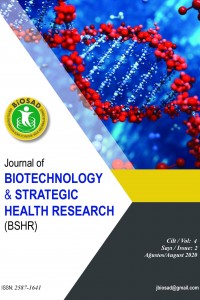Abstract
The principle of "protecting is both superior and cheaper than treatment", which is one of the main principles of public health, will be often mentioned in terms of new world health policies after coronavirus (COVID-19). Forasmuch as the fact that the states did not fulfill the protective measures in the country's health policies caused very devastating results in the first 3 weeks as in the case of Europe after COVID-19 (healthcare personnel not having access to mask-protective materials, healthy individuals not having access to enough mask, patients not being able to find adequate health services). The lack of precautions for preventive measures reveals that therapeutic health care services will not work alone in the time of severe-destructive-spreading epidemics such as COVID-19. Because it was seen in the first wave of the epidemic that the world population, which did not have personal protective measures, soon became completely the host of the disease after the first transition from animal to human in terms of having and spreading the disease symptomatically or presymptomatically. It is clear that Covid-19 will further expand the importance of consuetudinary protective measures (personal and environmental) over the next century. It is clear that Covid-19 will further expand the importance of consuetudinary protective measures (personal and environmental) in the next century. This situation will be considered as the normal use of masks in places where the density of people is high, portable hand disinfectants will be used, frequent washing of the hands with the usual soap, personal protection measures, etc. reveals that many examples will lead to very strong behavioral changes. Governments are required to change policy on preventive health measures after Covid-19 and take permanent measures that will take under affect the entire population, starting with primary schools.
References
- 1- http://www.sdplatform.com/Yazilar/Kose-Yazilari/395/Gelecegin-saglik-hizmetleri.aspx. Erişim Tarihi: 15.04.2020. 2- Zhou F, Yu T, Du R, et al. Clinical Course and Risk Factors For Mortality of Adult İnpatients with CO- VID-19 in Wuhan, China: A Retrospective Cohort Study. Lancet 2020; 395(10229):1054-62. 3- Rothan HA, Byrareddy SN. The Epidemiology and Pathogenesis of Coronavirus Disease (COVID-19) Outbreak. Journal of Autoimmunity. 2020 February, 26:102433, doi: 10.1016/j.jaut.2020.102433. 4- Avcı Demir Y., Kişisel sağlık sorumluluğu, TAF Preventive Medicine Bulletin, 2016; Cilt:15, Sayı: 3. 5- Steinbrook R., Healthcare Reform in Massachusetts a Work in Progress, The New England Journal of Medıcıne, 2006;18;354(20):2095-8. 6- Bağcı H., Atasever M., Türkiye Sağlık Sistemi, Akademisyen Kitabevi, Ankara, 2020;4-6. 7- https://www.atlasdergisi.com/gundem/koronavirus-hangi-yuzeyde-ne-kadar-kaliyor.html. Erişim Tarihi: 16.04.2020. 8- https://bilimteknik.tubitak.gov.tr/system/files/biltek_arsiv/btd_eylul_22.pdf. Erişim Tarihi: 20.04.2020.
Abstract
Halk sağlığının ana kavramlarından biri olan “korumak tedaviden hem üstün hem de ucuzdur” ilkesi, Koronavirüs (COVİD-19) sonrası yeni dünya sağlık politikaları açısından adından sıkça söz ettirecektir. Zira devletlerin ülke sağlık politikalarında koruyucu önlem politikalarını yerine getirmemiş olmaları, COVİD-19 sonrası Avrupa örneğinde olduğu gibi ilk 3 haftada yüksek yıkıcı sonuçlara yol açmıştır (sağlık personelinin maskeye-koruyucu malzemelere ulaşamaması, sağlıklı bireylerin yeterli maskeye ulaşamamış olmaları, hastaların yeterli sağlık hizmetlerini bulamaması). Koruyucu önlemlere yönelik tedbirlerin alınmamış olması tek başına tedavi edici sağlık hizmetlerinin, COVİD-19 gibi şiddetli-yıkıcı-yayılmacı salgın hastalıklar anında işe yaramayacağını ortaya koymaktadır. Zira salgının ilk dalgasında görüldü ki kişisel koruyucu önlemlere sahip olmayan dünya nüfusu, kısa süre içerisinde semptomatik veya presemptomatik olarak hastalığa sahip olma ve hastalığı yayma konusunda ilki hayvandan insana geçme durumundan daha sonra başlı başına tamamen hastalığın konakçısı oluverdiler. COVİD-19’ un gelecek yüzyılda alışılagelmiş koruyucu önlemlerin (kişisel ve çevresel) önemini daha fazla genişleteceği aşikardır. Bu durum bundan sonra insan yoğunluğunun fazla bulunduğu yerlerde maske kullanımının normal kabul edileceği, taşınabilir el dezenfektanlarının kullanılacağı, daha önce alışılagelen sabun ile ellerin sık sık yıkanması kişisel koruma önlemleri vb. pek çok örneklerin çok güçlü davranış değişikliklerine yol açacağını ortaya koymaktadır. Hükümetlerin COVİD-19 sonrası koruyucu sağlık önlemleri konusunda politika değişikliğine giderek, ilkokullardan başlayarak tüm nüfusu etkisi altına alacak kalıcı tedbirleri almaları gerekmektedir.
References
- 1- http://www.sdplatform.com/Yazilar/Kose-Yazilari/395/Gelecegin-saglik-hizmetleri.aspx. Erişim Tarihi: 15.04.2020. 2- Zhou F, Yu T, Du R, et al. Clinical Course and Risk Factors For Mortality of Adult İnpatients with CO- VID-19 in Wuhan, China: A Retrospective Cohort Study. Lancet 2020; 395(10229):1054-62. 3- Rothan HA, Byrareddy SN. The Epidemiology and Pathogenesis of Coronavirus Disease (COVID-19) Outbreak. Journal of Autoimmunity. 2020 February, 26:102433, doi: 10.1016/j.jaut.2020.102433. 4- Avcı Demir Y., Kişisel sağlık sorumluluğu, TAF Preventive Medicine Bulletin, 2016; Cilt:15, Sayı: 3. 5- Steinbrook R., Healthcare Reform in Massachusetts a Work in Progress, The New England Journal of Medıcıne, 2006;18;354(20):2095-8. 6- Bağcı H., Atasever M., Türkiye Sağlık Sistemi, Akademisyen Kitabevi, Ankara, 2020;4-6. 7- https://www.atlasdergisi.com/gundem/koronavirus-hangi-yuzeyde-ne-kadar-kaliyor.html. Erişim Tarihi: 16.04.2020. 8- https://bilimteknik.tubitak.gov.tr/system/files/biltek_arsiv/btd_eylul_22.pdf. Erişim Tarihi: 20.04.2020.
Details
| Primary Language | Turkish |
|---|---|
| Subjects | Health Care Administration |
| Journal Section | Review |
| Authors | |
| Publication Date | August 31, 2020 |
| Acceptance Date | July 4, 2020 |
| Published in Issue | Year 2020 Volume: 4 Issue: 2 |
Cited By
Psychometric properties of pandemic awareness scale for students aged 8–12: The case of COVID-19
Children and Youth Services Review
https://doi.org/10.1016/j.childyouth.2023.106944
Journal of Biotechnology and Strategic Health Research


